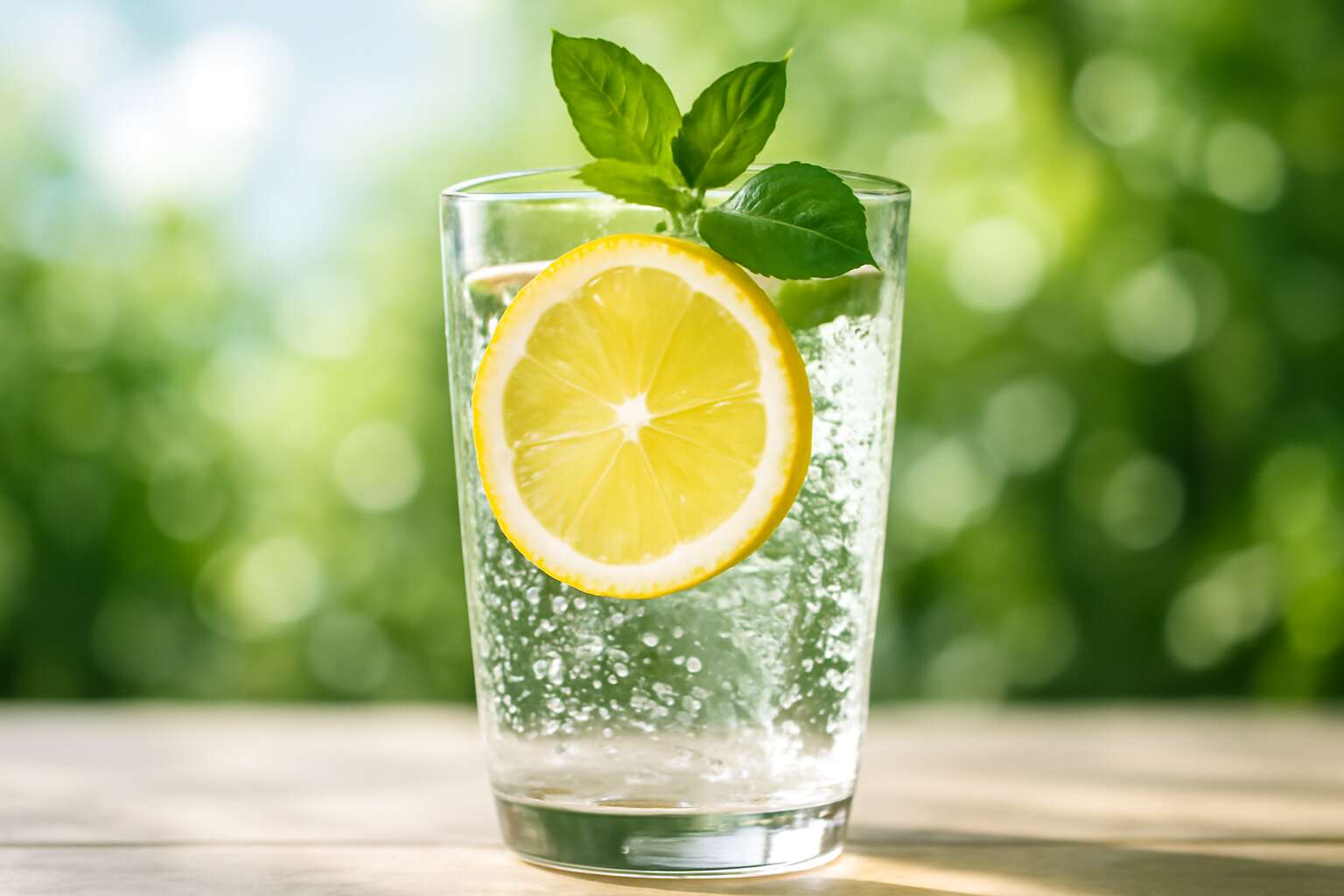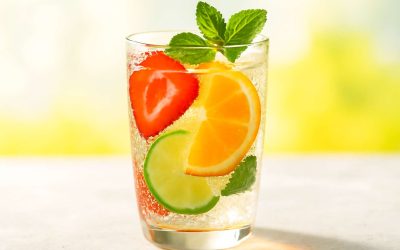Understanding Sparkling Water
What is Sparkling Water?
Within the shimmering world of beverages, sparkling water stands out as a captivating alternative to sugary sodas and artificially flavored drinks. This effervescent elixir, often hailed as a healthier choice, is simply water infused with carbon dioxide gas under pressure, creating those lively bubbles that dance on the palate. But is sparkling water good for you? The answer isn’t as straightforward as it might seem, as it depends on factors like added flavors and mineral content.
Pure sparkling water, free from added sugars and artificial sweeteners, can be a refreshing way to stay hydrated while indulging in a sensory experience that mimics the fizz of soda. It’s also a source of vital minerals such as calcium and magnesium, which contribute to overall well-being. Some brands even fortify their sparkling water with electrolytes, making it not just a beverage, but a boost for those seeking balance and vitality.
Understanding sparkling water involves recognizing its natural properties and potential health benefits. It’s a beverage that balances sophistication with simplicity, inviting us to reconsider hydration’s role in our daily lives. For many, its crisp, bubbly nature is a celebration of life’s small pleasures, hinting at a world where wellness and indulgence coexist seamlessly.
Types of Sparkling Water
Understanding the nuances of sparkling water reveals a fascinating spectrum of options, each with unique characteristics that influence their health profile. Not all sparkling waters are created equal; some are simply carbonated water, while others are infused with natural flavors, minerals, or electrolytes. This diversity prompts a deeper inquiry: is sparkling water good for you? The answer hinges on its composition and how it fits into your overall hydration habits.
Among the various types, three primary categories stand out:
- Natural Sparkling Water: Sourced directly from mineral springs, this type retains its natural mineral content, offering a subtle, complex flavor profile without additives.
- Club Soda: Typically infused with added minerals like sodium bicarbonate and potassium sulfate, which enhance taste but may influence sodium intake.
- Flavored Sparkling Water: Often contains natural or artificial flavorings, and sometimes sweeteners, raising questions about their impact on health — an important consideration when asking, is sparkling water good for you?
The richness of mineral content, particularly in natural varieties, can provide beneficial electrolytes, yet it’s essential to be mindful of added ingredients that could diminish its health benefits. As the market evolves, consumers increasingly seek options that balance pleasure with wellness, making understanding these distinctions crucial in deciding whether is sparkling water good for you truly applies to your lifestyle.
How Sparkling Water Is Made
Understanding how sparkling water is made reveals a fascinating process that transforms simple H2O into a fizzy delight. At its core, the process involves dissolving carbon dioxide gas into water under pressure—think of it as a tiny, bubbly magic trick. This method produces the signature effervescence that makes sparkling water so appealing, whether you’re spritzing it into a fancy cocktail or just enjoying it solo.
But what about the actual composition? Natural sparkling water often comes from mineral springs, where the water absorbs minerals along the journey—adding a subtle complexity to its taste. On the other hand, some brands infuse regular water with carbon dioxide post-production, creating a similar sparkle without the mineral richness. Interestingly, this carbonation process, while seemingly innocuous, can influence how we perceive hydration and health benefits.
To better understand the nuances, consider this simple step-by-step overview:
- Water is sourced from springs or municipal supplies.
- Carbon dioxide gas is injected under high pressure, creating the fizz.
- Additional minerals or flavorings may be added, depending on the type of sparkling water.
So next time you crack open a sparkling water, remember—its creation is a scientific ballet, blending natural sources with modern technology. This process not only influences whether is sparkling water good for you but also shapes its role in your hydration routine—whether it’s a health-conscious choice or just a bubbly indulgence.
Nutritional Profile of Sparkling Water
Calorie Content
When scrutinizing the nutritional profile of sparkling water, it’s essentially the ghost of plain water with a bubbly personality—minus the calories. Most unflavored sparkling water clocks in at zero calories, making it an ideal hydration companion for those watching their waistlines or simply craving a fizzy twist without the guilt. Unlike sugary sodas or artificially flavored drinks, sparkling water offers a crisp, refreshing experience without the metabolic baggage.
For the health-conscious, the calorie content of sparkling water is a game-changer. It’s a hydration hero that can satisfy the craving for carbonation without contributing to calorie overload. Some brands might add a dash of natural flavoring or minerals, but these usually don’t tip the calorie scales. So, the burning question remains—is sparkling water good for you? For most, the answer hinges on moderation and choosing options free from added sugars and artificial sweeteners.
In essence, sparkling water boasts a negligible calorie content, and drinking it can be a delightful way to stay hydrated without the caloric baggage. It’s a bubbly alternative that aligns perfectly with a health-conscious lifestyle—certainly worth considering in your daily hydration ritual!
Sugar and Additives
When examining the nutritional profile of sparkling water, one thing stands out as a clear winner: it’s practically pure hydration with a fizzy flair. Unlike sodas laden with sugar or artificial additives, plain sparkling water boasts a clean slate—zero calories and no hidden nasties. But what about the sugars and additives some brands sneak in to jazz up their bubbly offerings? The truth is, many flavored varieties contain either natural or artificial flavorings, but these rarely tip the scales in terms of health concerns.
Some brands add minerals like magnesium or potassium to enhance flavor and health benefits, transforming your ordinary sparkling water into a mineral-rich refreshment. Still, the real question remains: is sparkling water good for you? If you’re mindful of the ingredients—opting for options free from added sugars and sweeteners—it can be a delightful, guilt-free way to stay hydrated. After all, a drink that satisfies your craving for bubbles without the caloric baggage is hard to beat! Plus, with the rise of low-calorie and naturally flavored options, sparkling water is now more versatile and health-conscious than ever.
Mineral Content
When considering the nutritional profile of sparkling water, its mineral content often takes center stage. Unlike many beverages loaded with sugar or artificial additives, sparkling water can serve as a source of essential minerals. These minerals, naturally present or added during production, can contribute to your daily intake without the extra calories or chemicals.
Mineral-rich sparkling water typically contains elements like magnesium, potassium, and calcium. These are vital for maintaining healthy muscle function, nerve signaling, and bone strength. For those questioning is sparkling water good for you, understanding its mineral content helps clarify its benefits. Some brands even fortify their products with additional minerals, making each sip more than just bubbly refreshment—it’s a boost for your health.
Here’s a quick overview of common minerals found in sparkling water:
- Magnesium: Supports muscle and nerve function
- Potassium: Helps regulate blood pressure
- Calcium: Strengthens bones and teeth
In essence, mineral content enhances the nutritional value of sparkling water, making it a smart choice for hydration that also delivers beneficial nutrients—without the negatives often associated with sugary drinks. Whether it’s plain or naturally flavored, sparkling water can be a healthy addition to your daily routine, provided you select options with minimal or no added ingredients. So, is sparkling water good for you? When it’s mineral-rich and free from unnecessary additives, the answer is a resounding yes!
Health Benefits of Sparkling Water
Hydration
When it comes to staying hydrated without sacrificing flavor or fizz, sparkling water often becomes the unsung hero. Surprisingly, a significant 70% of health-conscious South Africans are turning to sparkling water as their go-to beverage—proof that hydration doesn’t have to be boring. But the question lingers: is sparkling water good for you? The answer isn’t just a simple yes or no; it’s a nuanced dance between hydration, mineral content, and lifestyle preferences.
Many argue that sparkling water can be just as hydrating as still water, especially when it replaces sugary sodas or fruit juices. Its effervescent nature can even encourage those who find plain water dull to drink more fluids throughout the day. Plus, with minerals like calcium, magnesium, and potassium naturally present in some varieties, sparkling water can contribute to your daily mineral intake. It’s almost as if hydration gets a little upgrade—without the added calories or sugar. So, is sparkling water good for you? For most, the answer is a bubbly yes—especially when enjoyed in moderation and as part of a balanced lifestyle.
Digestive Aid
Amid the effervescent swirl of health-conscious choices, sparkling water emerges not merely as a refreshing alternative but as a subtle agent of digestive harmony. Its carbonation stimulates the stomach, encouraging the production of gastric juices, which can aid in easing indigestion and bloating—a common plight in our fast-paced South African lifestyles. The fizzy nature of sparkling water can act as a gentle, natural stimulant, often alleviating feelings of nausea or discomfort after heavy meals.
Furthermore, certain varieties of sparkling water contain naturally occurring minerals such as magnesium and calcium—elements celebrated for their role in maintaining digestive health. Magnesium, in particular, is renowned for promoting regular bowel movements, while calcium helps soothe the gastrointestinal tract. Incorporating sparkling water into your daily routine might just transform it into a ritual of wellness, subtly supporting your digestive system without the need for harsher remedies.
So, when pondering whether is sparkling water good for you, consider its potential as a digestive aid—an effervescent touch that can turn hydration into a holistic experience. Its bubbly allure might just be more than a fleeting trend; it could be an intrinsic part of nurturing your gut health, especially in a landscape where wellness is increasingly woven into everyday choices.
Oral Health Considerations
In a landscape where wellness is often reduced to fleeting trends, the question of whether is sparkling water good for you transcends mere curiosity—it’s a reflection of deeper health pursuits. Sparkling water, with its effervescent charm, not only satisfies a craving for fizz but also subtly influences oral health in ways often overlooked. Its carbonation can act as a natural cleanser, helping to dislodge debris and reduce plaque buildup when consumed thoughtfully. Unlike sugary sodas, it doesn’t contribute to enamel erosion, making it a preferable choice for those seeking to preserve their smile’s integrity.
Furthermore, sparkling water’s mineral content—particularly calcium and magnesium—can fortify teeth and bones, adding a nuanced benefit to its consumption. Magnesium, for instance, supports the body’s natural ability to maintain healthy bones and teeth, while calcium is essential for enamel strength. However, it’s important to consider that excessive carbonation may lead to mild enamel sensitivity in some individuals. Overall, when integrated mindfully into a balanced diet, sparkling water can be a delightful and healthful component of your hydration regimen, offering more than just refreshment but genuine oral health benefits.
Comparison with Sugary Soft Drinks
When comparing the health benefits of sparkling water with sugary soft drinks, the choice becomes clearer—and more refreshing. Unlike sodas packed with added sugars and artificial flavors, sparkling water offers a crisp, invigorating alternative that supports your well-being without the calorie overload. The absence of sugar means it won’t spike your blood sugar levels, making it an excellent beverage for those mindful of their health and weight management goals.
Moreover, the natural carbonation in sparkling water can satisfy that craving for fizz, often associated with sweetened drinks, without leading to the sugar crash or dental concerns. For individuals asking, is sparkling water good for you, the answer is increasingly affirmative—especially when it replaces traditional sodas in your daily routine. As an added bonus, many varieties contain minerals like calcium and magnesium, which contribute to overall bone health and vitality.
- Reduced risk of tooth decay compared to sugary soft drinks
- Lower calorie content supports weight management
- Mineral content fosters stronger bones and teeth
While some skeptics worry about potential enamel erosion from carbonation, consuming sparkling water in moderation and choosing unflavored options can sidestep these concerns entirely. The truth is, when integrated thoughtfully, sparkling water isn’t just a trendy beverage—it’s a health-conscious choice that aligns with modern wellness pursuits in South Africa and beyond.
Potential Risks and Concerns
Dental Health
While sparkling water often dances on the tongue with its crisp, effervescent charm, questions linger about its potential risks, especially concerning dental health. The carbonation process introduces carbonic acid, which can temporarily lower the pH level in the mouth. Persistent exposure to this acidity might erode tooth enamel over time, making teeth more vulnerable to decay and sensitivity. It’s a delicate balance—enjoying the bubbly sensation without letting acidity take its toll.
For those who indulge regularly, it’s worth considering the following:
- Swapping out some glasses of sparkling water for still water can mitigate acid exposure.
- Using a straw helps reduce contact with teeth, preserving their natural defenses.
- Rinsing your mouth with plain water afterward can neutralize lingering acids.
Ultimately, asking yourself, “Is sparkling water good for you?” hinges on moderation and mindful consumption—lest the sparkle spark a different kind of concern. Remember, the allure of sparkling water is undeniable, but it’s wise to stay vigilant about its subtle impacts on oral health.
Digestive Discomfort
While sparkling water is often hailed as a healthier alternative to sugary sodas, it’s not without its quirks—and potential risks. One concern that’s often overlooked is digestive discomfort. For some, the carbonation can cause bloating, gas, or even mild stomach upset, especially if consumed in large quantities. The bubbles, delightful as they are, can sometimes irritate the stomach lining or lead to a feeling of fullness that’s more uncomfortable than satisfying.
To navigate these murky waters, it’s wise to listen to your body. If you notice persistent discomfort after a glass of sparkling water, consider cutting back or switching to still water. For those who love their bubbly, moderation is key—after all, asking yourself, “is sparkling water good for you?” should include how it makes your digestive system feel. Remember, the occasional fizzy sip shouldn’t cause chaos, but overdoing it might spark more than just a smile—perhaps even a bit of digestive disarray.
Impact on Bone Health
While sparkling water is often celebrated as a refreshing alternative to sugary sodas, some concerns linger beneath its fizzy surface. One of these concerns is the potential impact on bone health. The carbonation process, although generally safe, may lead to a slight decrease in bone mineral density when consumed excessively over time. This is especially relevant for those who might drink multiple glasses daily, unaware of the cumulative effects.
Research suggests that certain carbonated beverages could interfere with calcium absorption, subtly weakening bones—a worry some health experts continue to explore. For individuals questioning, “is sparkling water good for you?” it’s worth considering how much they indulge in this bubbly drink. An overreliance on carbonated waters, especially those with added acids or flavors, might inadvertently contribute to bone fragility. So, moderation remains the best approach, ensuring the body’s mineral balance isn’t compromised for the sake of bubbly refreshment. After all, balancing enjoyment with health is the true art of mindful hydration.
How to Incorporate Sparkling Water into Your Diet
Choosing the Right Type
Incorporating sparkling water into your diet can be both refreshing and beneficial, but knowing how to choose the right type is key. With so many options available, it’s easy to be overwhelmed. Fortunately, understanding what makes a sparkling water healthier can help you make better choices. For example, opting for plain sparkling water without added sugars or artificial flavors ensures you enjoy the fizzy sensation without the downsides associated with sugary soft drinks.
How you include sparkling water in your daily routine matters. You might consider replacing traditional sodas with sparkling water to cut down on sugar intake while still satisfying your craving for something bubbly. To make the transition smoother, try adding slices of citrus or fresh herbs for natural flavor. Remember, the goal is to enhance hydration without compromising your health. Here’s a simple approach to choosing the right sparkling water:
- Check the ingredient list – prioritize options with just carbonated water and natural flavorings.
- Beware of added sugars and artificial sweeteners that can negate health benefits.
- Consider mineral-rich varieties if you want to supplement your mineral intake naturally.
By selecting the appropriate type of sparkling water, you can enjoy a healthy, fizzy alternative that complements your wellness goals. So, is sparkling water good for you? It can be, especially when you make informed choices tailored to your health needs and taste preferences.
Balancing Carbonation and Hydration
Striking a delicate balance between carbonation and hydration can elevate your daily wellness ritual. Incorporating sparkling water into your routine isn’t merely about quenching thirst; it’s about embracing a sensory experience that energizes and refreshes. When thoughtfully included, sparkling water can serve as a sophisticated alternative to sugary beverages, nourishing your body without the unwanted calories or additives.
To truly enjoy the benefits of sparkling water while avoiding potential pitfalls, consider the following approach:
- Start by choosing plain sparkling water with no added sugars or artificial flavors—this preserves the purity and health benefits.
- Enhance your water naturally by adding slices of citrus, fresh herbs, or a splash of fruit juice, which can satisfy cravings and boost flavor without compromising health.
- Monitor your intake, balancing sparkling water consumption with still water throughout the day to maintain optimal hydration and prevent excessive carbonation, which can cause bloating or digestive discomfort.
In South Africa’s vibrant landscape, where hydration is vital in the climate, sparkling water offers an elegant way to stay refreshed. The key is moderation and mindful selection—making sparkling water not just a fleeting trend but a lasting element of your wellness journey. Is sparkling water good for you? When chosen and enjoyed with intention, it can indeed be part of a healthy, balanced lifestyle.
Tips for Healthier Consumption
In a nation that’s embracing hydration with the fervor of a rugby fan celebrating a try, incorporating sparkling water into your diet is a clever move—if done with a dash of savvy! Wondering how to make this fizzy beverage part of your wellness routine? It’s simpler than you think. First, opt for plain sparkling water, free from sneaky added sugars or artificial flavors, ensuring you enjoy the pure hydration benefits without any unnecessary calories. To elevate the experience, add natural flavor enhancers like citrus slices or fresh herbs—think mint or basil—to satisfy cravings without sacrificing health.
Next, aim for moderation. Balancing sparkling water with still water throughout the day helps maintain hydration without risking bloating or digestive discomfort from over-carbonation. Remember, it’s all about mindful consumption—because is sparkling water good for you? When enjoyed thoughtfully, it can be a delightful part of a balanced lifestyle, especially in South Africa’s hot climate where staying refreshed is essential.
Expert Opinions and Scientific Studies
Research Findings on Health Effects
When it comes to deciphering the health effects of sparkling water, expert opinions reveal a nuanced landscape. Many nutritionists acknowledge that, for most people, sparkling water is a safe alternative to sugary sodas, and in some cases, it even offers benefits like improved hydration and digestive comfort. However, some health professionals caution about the potential for carbonation to cause bloating or discomfort in sensitive individuals. Scientific studies have explored these concerns extensively, with findings generally indicating that moderate consumption of sparkling water does not harm bones or teeth—contrary to some popular myths.
Recent research highlights that sparkling water can be a beneficial part of a balanced diet, especially when it replaces higher-calorie beverages. An important aspect of these studies underscores the importance of choosing unflavored or mineral-rich varieties, which can provide extra minerals without added sugars or artificial additives. Ultimately, the question of whether sparkling water is good for you depends on individual health considerations, but the scientific consensus leans towards it being a safe, enjoyable hydration option for most people.
Dietary Recommendations
When it comes to the question of whether is sparkling water good for you, expert opinions paint a picture of cautious optimism. Many nutritionists agree that for most individuals, sparkling water serves as a safe and refreshing alternative to sugary sodas. It can even bolster hydration levels and aid digestion, making it a versatile beverage choice. However, some health professionals warn that the carbonation might cause bloating or discomfort in sensitive individuals, adding a layer of complexity to the conversation.
Scientific studies have largely dispelled myths that sparkling water harms bones or teeth, emphasizing that moderate consumption poses little risk. Research suggests that choosing unflavored or mineral-rich varieties enhances the benefits—delivering essential minerals without added sugars or artificial ingredients. The scientific consensus leans toward sparkling water being a nourishing, enjoyable hydration option, especially when integrated into a balanced diet. For those questioning if sparkling water is good for you, the evidence indicates it can be a healthy, delightful addition to daily life—so long as individual health considerations are taken into account.
Expert Advice
Experts are increasingly weighing in on the question: is sparkling water good for you? Many nutritionists highlight its benefits as a low-calorie, hydrating alternative to sugary beverages. They often point out that moderate consumption of sparkling water can support hydration and even promote healthy digestion. While some worry about the effects of carbonation, recent scientific research suggests that the potential for harm is minimal when enjoyed responsibly.
Scientific studies have clarified misconceptions surrounding sparkling water’s impact on health. For example, evidence shows that carbonation does not weaken bones or erode tooth enamel when consumed in moderation. Instead, choosing mineral-rich, unflavored varieties can provide essential minerals without added sugars or artificial ingredients. Experts emphasize that individual sensitivities matter—some people might experience bloating, but for most, sparkling water remains a safe, enjoyable hydration option.




0 Comments